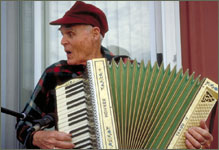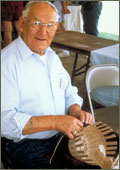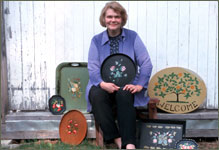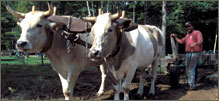
Folklife and traditional arts are an important part of our living cultural heritage. Tradition bearers pass this knowledge on from one generation to the next, one person to another. With each change of hands, what is important from the past is kept and cherished and little bits of wisdom and beauty are added.

National Heritage Fellowship recipient
and contra dance musician Bob
McQuillen from Peterborough, NH.
Folklife and traditional arts grow out of communities or groups that have something in common-a language, a geographic area, a religion, an occupation, or a way of life. In traditional arts, the sense of what is beautiful and well done – the aesthetics – is defined by the community from which it emerged. The creativity of a traditional artist is expressed within the tradition, as when a quilter chooses the colors for traditional quilt pattern, a blacksmith adds his own leaf design on a door latch, or a fiddler adds certain ornamental notes to the playing of a fiddle tune.
The techniques and forms of folklife and traditional arts change very slowly. Being true to the past is more important than change or innovation. Because of this, folklife traditions and traditional arts can take on symbolic meanings for a community. They can become something the community is proud of, something that says to the world, "this is who we are."

National Heritage
Fellowship recipient
and ash basket
maker Newt
Washburn of
Bethlehem, NH
The mastery of traditional ways of doing things and making things requires skill and many years of dedication. Tradition bearers are often well respected in their community and recognized for the personal sacrifices – such as time and money – that they make in order to preserve their heritage.
Folklife
Folklife is term that means the traditional way we do things. It can include telling stories, cooking, recreational activities like sled dog racing and fishing, and different types of work like stone wall building, granite quarrying, boat building, timber framing, and farming.
People involved in occupational folklife traditions – like wooden boat building or stone masonry – may earn most of their livelihood with their tradition. However, many traditional craftspeople and musicians earn their living in other ways, pursuing their traditions in their spare time.
Traditional Arts - Music, Dance & Crafts
Traditional arts are expressed in music, dance and crafts.
Much of traditional music is social. It is meant to be sung or danced to with family and friends. Some traditional music, however, is very personal and enjoyed more privately.

Traditional Arts Apprenticeship
recipient Beverly Nemetz
with her decorative painting.
Traditional musicians often learn to play "by ear" without the use of musical notation. Over their lifetimes traditional musicians can master a range of complex techniques and a vast repertoire.
Traditional crafts are usually made to answer the needs of day-to-day life – such as a basket, a quilt, a rug, an iron hinge, a fishing fly, or a wooden spoon. Most traditional craftsmen have high standards of craftsmanship and pride themselves in making forms that work well and are beautiful. Traditional crafts often become family and community heirlooms – precious and irreplaceable.
Many traditional crafts emerged in rural areas well before the industrial revolution introduced mass production and before plastics were common. Knowledge of how to prepare natural materials is essential to many traditional crafts. Some crafts require materials that are hard to obtain, especially for people living in urban areas.

The Patten family has been raising
oxen and working with them
on their farm for generations.
Keeping Our Heritage
In our very complex modern world, traditional ways of making music, crafting useful items and socializing are sometimes thought of as old fashioned. Some traditions are under pressure to change and some just disappear. We are fortunate that in New Hampshire, people have a great appreciation for history and traditional arts. Many communities have tradition bearers who are dedicated to preserving their traditional way of doings things, making things and playing music. Their knowledge and wisdom enrich our families, communities, and country.
Photo credit: Lynn Martin Graton
New Hampshire State Council on the Arts
19 Pillsbury Street - 1st Floor, Concord, NH 03301


